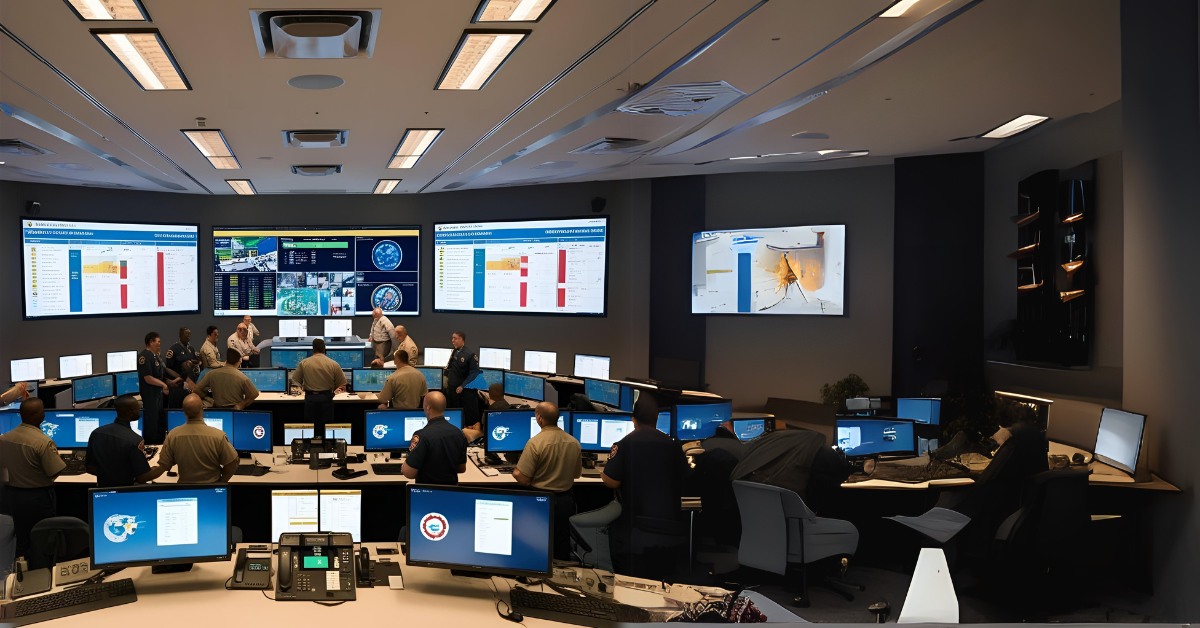Intermediate

Level 3 Diploma in Crisis Management and Incident Command Systems
Level 3 Diploma in Crisis Management and Incident Command SystemsCourse OverviewThe Level 3 Diploma in Crisis Management and Incident Command Systems is designed for professionals seeking to develop the skills necessary to manage crises and lead effective incident responses. The course provides a comprehensive understanding of crisis management strategies, incident command systems (ICS), and the coordination of resources and teams during high-pressure situations. This qualification is ideal for individuals who work in emergency services, public safety, health and safety, or risk management roles, equipping them with the practical and theoretical knowledge needed to respond to and manage crises across various environments.Benefits
Who is This Designed For?This diploma is ideal for:
- Gain in-depth knowledge of crisis management techniques and incident command systems (ICS).
- Learn how to lead teams, manage resources, and make critical decisions under pressure during crises.
- Develop the skills to coordinate and implement effective response strategies in emergency situations.
- Understand the role of communication, teamwork, and decision-making in managing complex incidents.
- Enhance career prospects in crisis management, emergency response, and public safety sectors.
- Understand the principles and strategies of crisis management.
- Implement and manage Incident Command Systems (ICS) during emergencies.
- Lead teams and manage resources effectively in high-pressure situations.
- Develop and evaluate crisis response plans and strategies.
- Communicate effectively during a crisis and understand the importance of stakeholder management.
- Make informed decisions and prioritize actions during incidents.
- Introduction to Crisis Management
- Defining crisis management: understanding what constitutes a crisis and the different types of crises.
- The stages of crisis management: preparation, response, recovery, and mitigation.
- Key principles of crisis management: leadership, communication, resource management, and decision-making.
- Understanding crisis impact and how crises can affect organizations and communities.
- Incident Command Systems (ICS)
- Overview of Incident Command Systems: structure, functions, and roles.
- The ICS model: its application in managing large-scale incidents.
- Responsibilities of incident commanders and other key personnel within the ICS structure.
- Integrating ICS with other emergency management systems and agencies.
- Crisis Response Planning and Preparedness
- Developing crisis response plans: objectives, strategies, and contingency planning.
- Risk assessments and vulnerability analysis in crisis planning.
- Crisis management frameworks and protocols: understanding how to align plans with organizational and national guidelines.
- Preparing teams for crisis scenarios: training, drills, and scenario planning.
- Leadership in Crisis Management
- The role of leadership in crisis management: decision-making, delegation, and accountability.
- Leading under pressure: maintaining calm, providing direction, and supporting teams during crises.
- Decision-making models in crisis situations: assessing risks, prioritizing actions, and determining outcomes.
- Leadership communication: delivering clear, concise, and timely information to stakeholders and responders.
- Resource Management in Crisis Situations
- Coordinating resources: human, financial, and material resources during incidents.
- Logistics in crisis management: supply chains, transportation, and managing emergency assets.
- Ensuring adequate staffing levels and team management during a crisis.
- Budgeting and financial management during incidents, including funding and resource allocation.
- Communication and Stakeholder Management
- Effective communication strategies in crisis management: internal and external communication.
- Managing stakeholders: coordinating with authorities, media, and the public during crises.
- Crisis communication techniques: messaging, updates, and managing misinformation.
- Building relationships with emergency services, government agencies, and non-governmental organizations (NGOs).
- Post-Crisis Evaluation and Recovery
- Crisis recovery and business continuity: planning for the return to normal operations.
- Evaluating crisis response efforts: lessons learned, after-action reports, and continuous improvement.
- Managing psychological and emotional impacts of crises on individuals and teams.
- Developing a culture of resilience: ensuring future preparedness through regular assessments and training.
- Legal and Ethical Considerations in Crisis Management
- Legal responsibilities of crisis managers: liability, accountability, and compliance.
- Ethical considerations: decision-making under uncertainty, fairness, and transparency.
- Understanding the regulatory environment surrounding crisis management.
- Crisis documentation and record-keeping for legal and insurance purposes.
| Unit Title | GLH | TQT | Credit | Assessment Type |
| Introduction to Crisis Management | 15 | 30 | 3 | Assignment-based |
| Incident Command Systems (ICS) | 18 | 36 | 3.5 | Assignment-based |
| Crisis Response Planning and Preparedness | 18 | 36 | 3.5 | Assignment-based |
| Leadership in Crisis Management | 18 | 36 | 3.5 | Assignment-based |
| Resource Management in Crisis Situations | 15 | 30 | 3 | Assignment-based |
| Communication and Stakeholder Management | 16 | 32 | 3 | Assignment-based |
| Post-Crisis Evaluation and Recovery | 15 | 30 | 3 | Assignment-based |
| Legal and Ethical Considerations in Crisis Management | 15 | 30 | 3.5 | Assignment-based |
- Emergency responders, police, fire, and rescue personnel who are involved in incident command and crisis management.
- Risk managers, health and safety officers, and business continuity planners.
- Professionals in public safety, disaster response, and humanitarian aid sectors.
- Crisis management consultants or coordinators within organizations.
- Individuals aiming to move into senior roles in crisis management, incident command, or emergency response.
- Take on roles such as Crisis Manager, Incident Commander, Emergency Response Coordinator, or Risk Manager.
- Progress to higher-level qualifications in crisis management, emergency planning, or public safety.
- Advance to leadership roles in disaster recovery, public safety coordination, or national emergency management.
- Work in various sectors, including government, healthcare, manufacturing, telecommunications, or international organizations.
- Expert-Led Learning: Learn from experienced professionals with practical knowledge in crisis management and incident command systems.
- Practical Application: Gain real-world experience through case studies, role-playing, and simulations of emergency scenarios.
- Global Recognition: Earn a qualification that is highly respected and recognized across various industries, enhancing career prospects in crisis management.
- Comprehensive Coverage: Develop the skills to lead and manage all aspects of crisis situations, from planning and response to recovery and evaluation.
Qualification Profile
Qualification Title:
Level 3 Diploma in Crisis Management and Incident Command Systems
Level: 3
Type: Diploma
Total Qualification Time (TQT): 260 hours
Guided Learning Hours (GLH): 130 hours
Credit Value: 26 credits
Assessment Method: Assignment-based
Grading: Pass/Fail
Delivery Mode: Classroom / Online / Blended
Study Units Breakdown
| Unit Title | GLH | TQT | Credit | Assessment Type |
| Introduction to Crisis Management | 15 | 30 | 3 | Assignment-based |
| Incident Command Systems (ICS) | 18 | 36 | 3.5 | Assignment-based |
| Crisis Response Planning and Preparedness | 18 | 36 | 3.5 | Assignment-based |
| Leadership in Crisis Management | 18 | 36 | 3.5 | Assignment-based |
| Resource Management in Crisis Situations | 15 | 30 | 3 | Assignment-based |
| Communication and Stakeholder Management | 16 | 32 | 3 | Assignment-based |
| Post-Crisis Evaluation and Recovery | 15 | 30 | 3 | Assignment-based |
| Legal and Ethical Considerations in Crisis Management | 15 | 30 | 3.5 | Assignment-based |
Upon completing this diploma, learners will be able to:
- Understand the principles and strategies of crisis management.
- Implement and manage Incident Command Systems (ICS) during emergencies.
- Lead teams and manage resources effectively in high-pressure situations.
- Develop and evaluate crisis response plans and strategies.
- Communicate effectively during a crisis and understand the importance of stakeholder management.
- Make informed decisions and prioritize actions during incidents.
This diploma is ideal for:
- Emergency responders, police, fire, and rescue personnel who are involved in incident command and crisis management.
- Risk managers, health and safety officers, and business continuity planners.
- Professionals in public safety, disaster response, and humanitarian aid sectors.
- Crisis management consultants or coordinators within organizations.
- Individuals aiming to move into senior roles in crisis management, incident command, or emergency response.
Assessment Type: Assignments Based
Top Courses
Related Courses
Let's Get in touch
Deleting Course Review
Are you sure? You can't restore this back
Course Access
This course is password protected. To access it please enter your password below:



